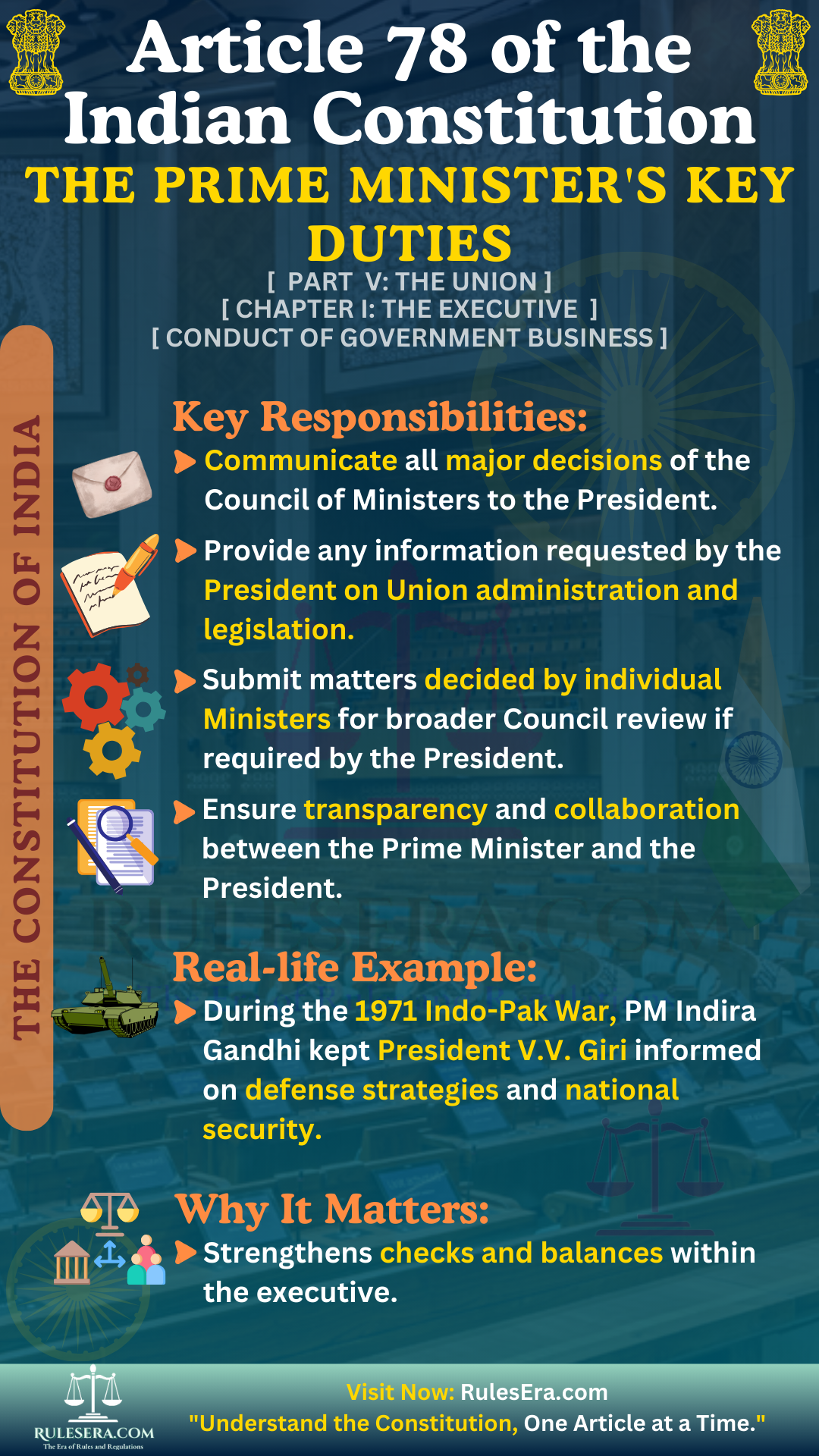Part V: The Union
Chapter II: The Executive
The Prime Minister
Article 78: Duties of Prime Minister as respects the furnishing of information to the President, etc.

--- Original Article ---
It shall be the duty of the Prime Minister:
- (a) to communicate to the President all decisions of the Council of Ministers relating to the administration of the affairs of the Union and proposals for legislation;
- (b) to furnish such information relating to the administration of the affairs of the Union and proposals for legislation as the President may call for;
- (c) if the President so requires, to submit for the consideration of the Council of Ministers any matter on which a decision has been taken by a Minister but which has not been considered by the Council.
Explanations
Article 78 of the Constitution of India specifies the responsibilities of the Prime Minister in keeping the President informed about the decisions made by the Council of Ministers. This provision ensures that the President, as the ceremonial head of state, remains aware of critical governmental affairs and maintains a channel of accountability within the executive branch.
Clause (a): Communication of Decisions
The Prime Minister is required to communicate to the President all decisions made by the Council of Ministers concerning the administration of the Union’s affairs and legislative proposals. This duty emphasizes the collaborative nature of governance, ensuring the President is continuously informed of the actions and policies proposed by the executive body.
Clause (b): Furnishing Information upon Request
In addition to keeping the President informed, the Prime Minister must provide any specific information related to Union administration or legislative proposals that the President may request. This clause reinforces the President's role in overseeing the functioning of the Union and keeping informed about significant national affairs.
Clause (c): Submitting Matters for Council Consideration
The Prime Minister must also submit for the Council of Ministers' review any matter decided by a Minister if the President so requires, particularly if it has not been considered by the Council. This provision ensures checks and balances within the executive branch by enabling the President to bring specific matters for broader ministerial consideration when deemed necessary.
Amendments and Historical Context
Article 78 remains unamended since its inclusion in the original Constitution of India. Its inclusion reflects the framers' intent to establish a balance between the President's ceremonial duties and the Prime Minister's role in effective governance. The article acknowledges the importance of keeping the President informed without granting direct executive powers.
Real-Life Example
- In practice, the Prime Minister regularly updates the President on matters of national importance, such as during the COVID-19 pandemic, when the President was briefed on government measures to tackle the crisis.
- During the 1971 Indo-Pak war, Prime Minister Indira Gandhi communicated with President V.V. Giri on defense strategies and mobilization efforts, demonstrating Article 78’s relevance in times of crisis.
Legislative History
Article 78 of the Indian Constitution, originally deliberated as Article 65 of the Draft Constitution, was discussed in depth on January 6th, 1949. Following these discussions, it was subsequently incorporated into the final text of the Indian Constitution.
Debates and Deliberations
During the debate, Shri H. V. Kamath suggested the addition of the phrase “as soon as they are made.” Despite Kamath’s advocacy for this amendment to ensure immediate communication, his proposal was ultimately rejected, leaving the original text of the article unchanged.
Frequently Asked Questions (FAQs):
Article 78 outlines the duties of the Prime Minister to keep the President informed of all decisions made by the Council of Ministers and to furnish any requested information.
No, Article 78 has not been amended since its inclusion in the original Constitution of India.